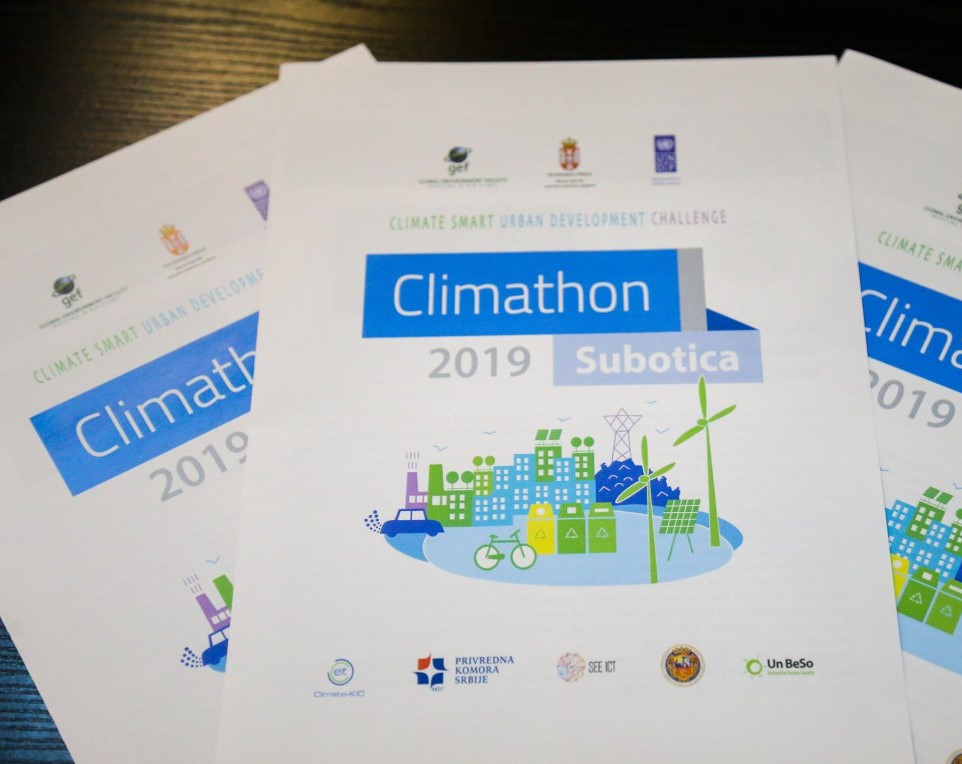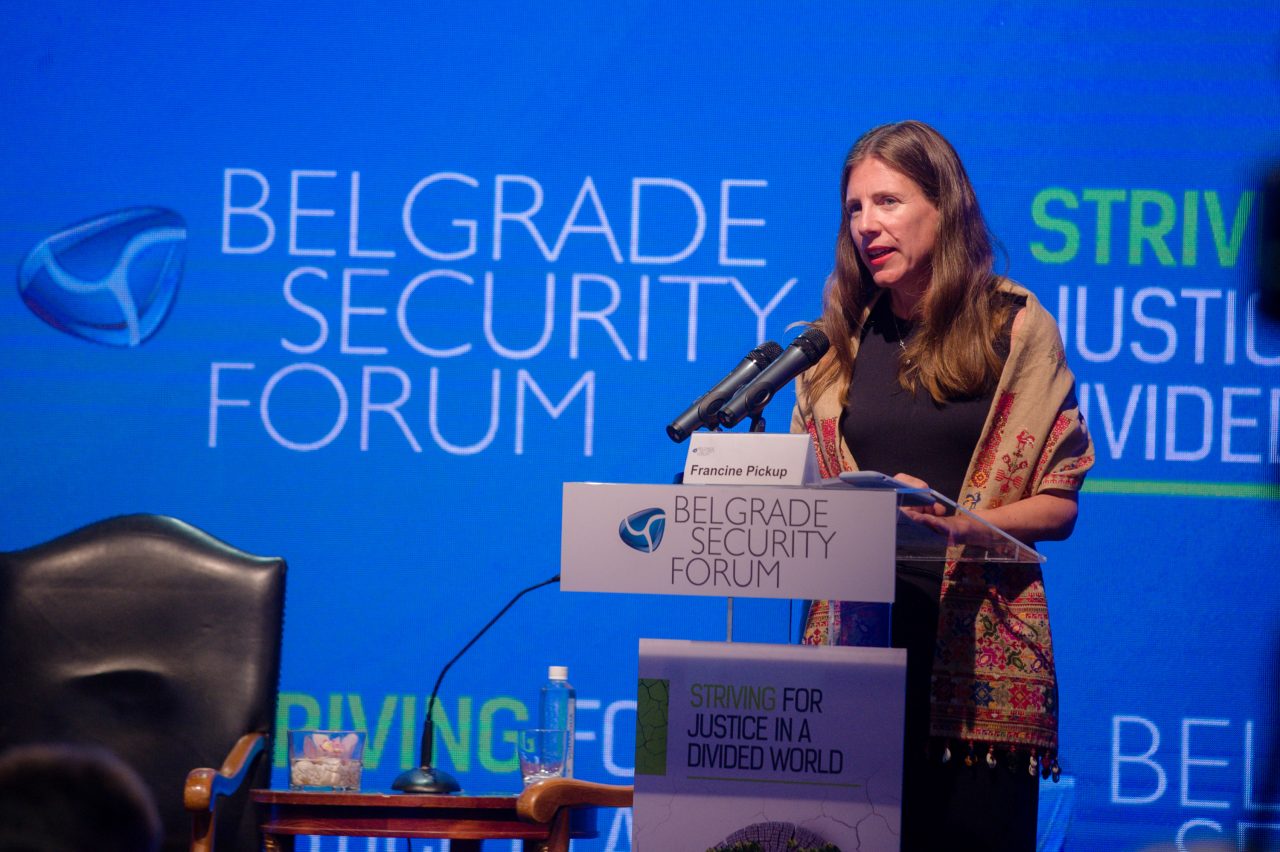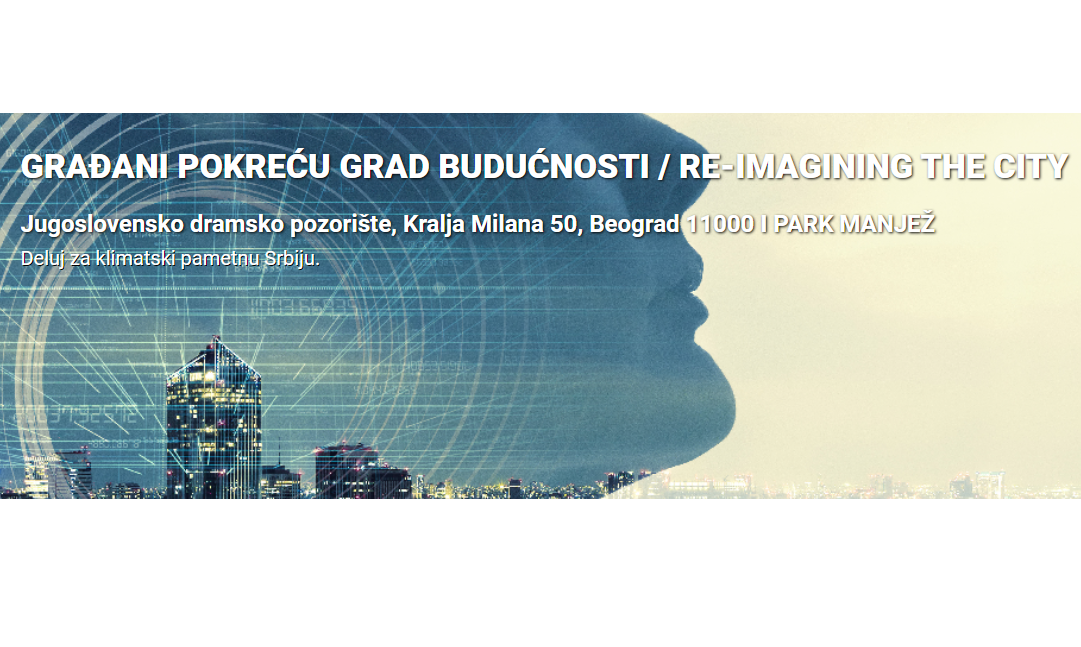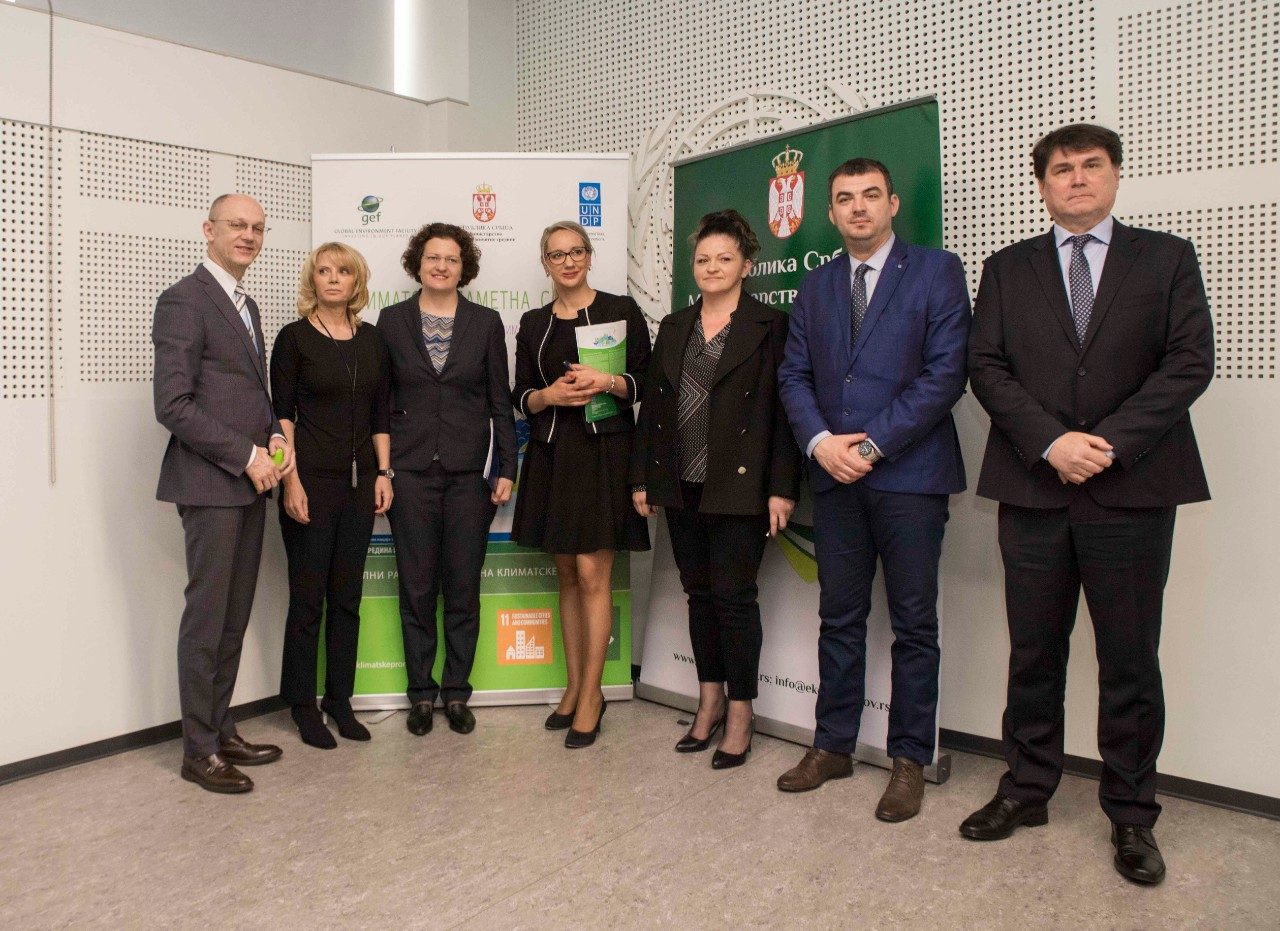-
Oct 23 2019 Climathon will be held in five cities of Serbia on October 25th
This year’s Climathon, a global event dedicated to address the climate challenges and involving more than 200 cities around the world, will be held on October 25th in Belgrade, Subotica, Čačak, Novi Sad and Niš. Participants organized in groups and with support of experts will be looking for sustainable solutions for climate challenges in a specific area in each city for 24 hours. The jury will select the most innovative ideas for awards.
The Climathon is established as a 24-hour festival that takes place in many cities in the form of hackathon competitions. During the competition, participants present innovative ideas and use new technologies to solve environmental and climate change problems.
The target groups of Climathon are high school students, university students, start-up community, NGOs and citizens.
Climathon in Čačak and Subotica is supported by the project “Climate Smart Urban Development Challenge” which implement Ministry of Environmental Protection with the support of the United Nations Development Program (UNDP) and the financial support of the Global Environment Facility (GEF) and by Climate KIC Serbia in Niš i Novi Sad.
-
Oct 19 2019 Climate Change Was One of the Most Important Topics of the 9th Belgrade Security Forum
The climate on Earth is changing rapidly and radically. The intensity of extreme weather events – heatwaves, forest fires, floods and droughts, have increased in the past 50 years. These occurrences have happened before, but on average once a decade, and today they occur every year or even several times a year. With the current average global temperature increase of approximately 1°C above the pre-industrial levels, it has become evident that we cannot reverse global warming during our lifetime. What we can is to stop global warming at 1.5-2 °C warmer than before pre-industrial level. These are the boundaries of what we, as a species, can adapt to. Weather conditions have already made people’s lives impossible in many places on the planet. Only in 2018, 17.2 million people have been displaced by climate-induced disasters in 148 countries and territories around the world.
The impact of climate change on security policy and economic and social development was the topic at the 9th Belgrade Security Forum, held from 16 to 18 October. At the panels “Climate Security: Adaptation, Mitigation, Change” and “Socio-economic Aspects of the Impact of Climate Change in Serbia” UNDP experts as well as experts from various fields of research and work that covers climate change discussed on the topic.
UNDP Resident Representative in Serbia Francine Pickup underlined that cities have a key role to play in fighting climate change, which is why at the recent UN Climate Change Summit in New York, leaders of states, private sector and civil society have launched numerous initiatives to transform cities into energy-efficient, inclusive and sustainable places to live. At the Summit, the youth took the front and center stage and sent a clear message that we are responsible for taking action immediately.
„More than half of the world’s population lives in cities and two-thirds will live in cities by 2050. Cities also produce more than 70 per cent of the world’s greenhouse gas emissions (GHG) and use 80 per cent of the world’s energy. They are the places where the effects of the climate emergency are already severely felt, particularly amongst the most vulnerable populations”, explained Pickup.
Serbia’s Minister of Environmental Protection Goran Trivan spoke about activities taken by Serbia to reduce GHG emissions and create climate-resilient urban communities.
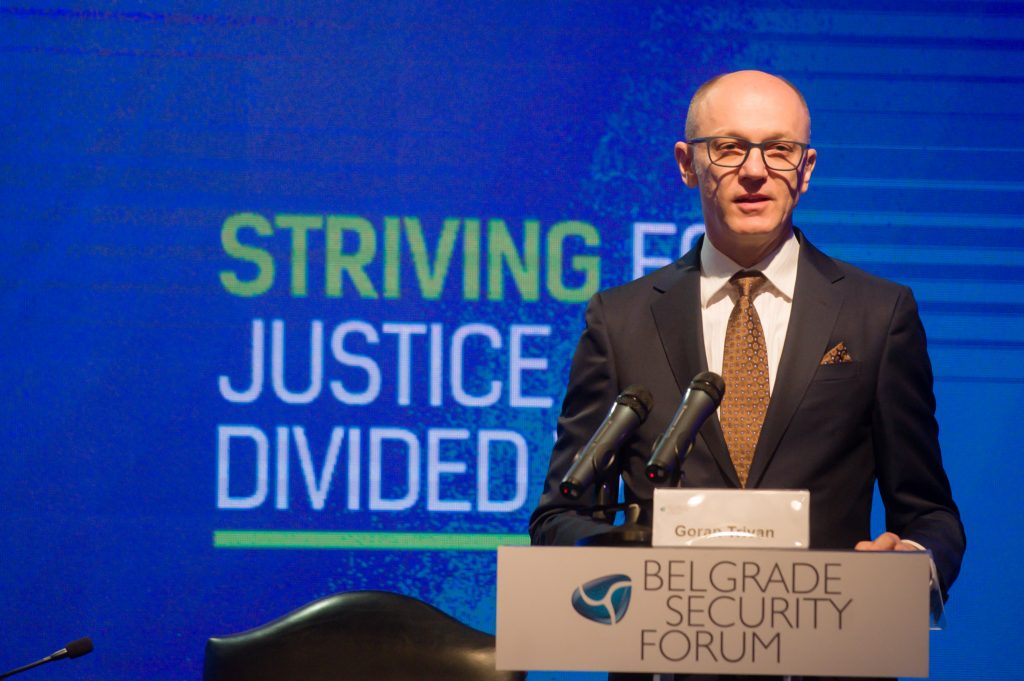
„The Ministry is working to establish an institutional, legislative and strategic framework to fight climate change. This implies the adoption of the Draft Law on Climate Change, which will serve as a basis for encouraging many activities. Also, a Draft Climate Change Strategy with an Action Plan has been prepared, which will determine the direction of low-carbon development and the path to reducing greenhouse gas emissions through specific mitigation measures. It is already evident that our ambitions to reduce GHG emissions under the Paris Climate Agreement will increase two to three times compared to 2015. In addition, as part of the revision of the Nationally Determined Contributions, Serbia will elaborate the aspect of adapting key economic sectors to the expected climate change, primarily in agriculture, water management, forests but also natural resources and public health protection“, explained Minister Trivan.
He recalled that, according to the data of the Statistical Office of the Republic of Serbia, 60 per cent of the population lives in cities in Serbia. However, this percentage will increase, as well as effects on the quality of life. Communities are expanding, but green spaces are decreasing. The number of vehicles on the streets, the amount of municipal waste and wastewaters and air pollution will increase as well as the consumption of energy for heating and cooling. All of this has the effect of increasing and intensifying the impact of climate change.
Associate Professor at the Meteorology Group at the Faculty of Physics, University of Belgrade, Vladimir Đurđević, pointed out the dangers and proportions of damage that global temperature rise of more than 2 degrees Celsius could bring.
“Our functioning on the planet depends on maintaining a stable climate. We are now outside the thermal optimum, but if we keep the temperature rise below 2 degrees, we could adapt to the changes that it brings. If we go above 2 degrees, the economy will be in a serious decline and we will trigger the so-called turning points in our climate system. A 1 degree increase in temperature has lasted for more than 100 years, while a new 1 degree increase will occur in just 30 years”.
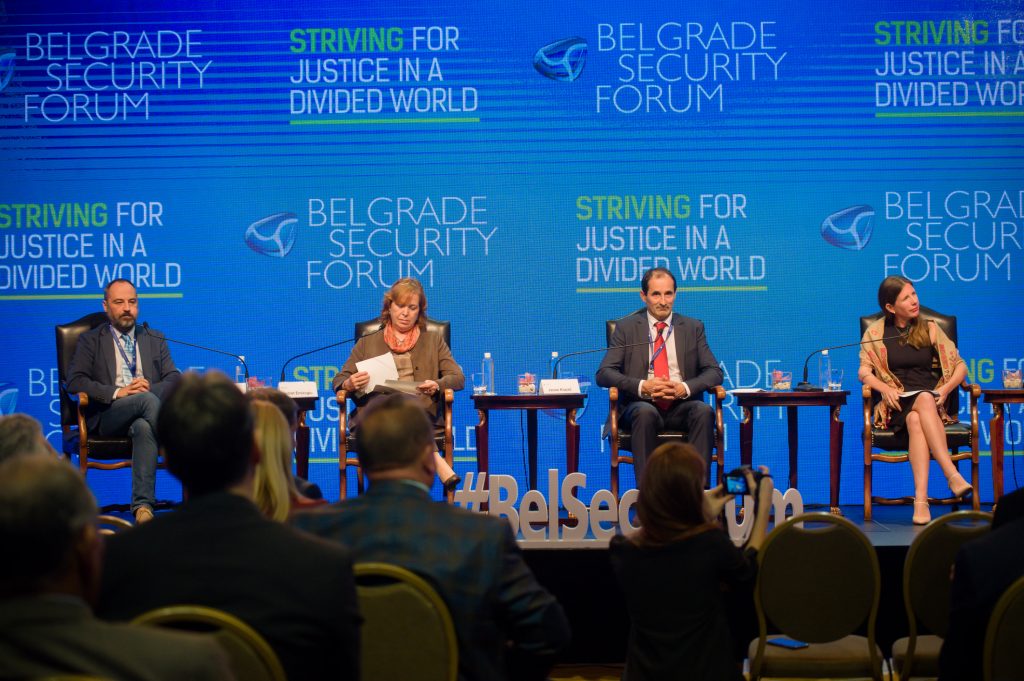
Đurđević stressed that we can expect a decrease in rainfall during the summer and therefore intense droughts. He noted that the last couple of years have seen 5 heat waves during the summer, unlike the previous decades, and that torrential city floods are much more risky because of the infrastructure that is built for stable weather.
The World Health Organization Data from shows that climate change also causes numerous health problems. Director of the Regional Office of the World Health Organization for Europe Nedret Emiroglu believes it is important to raise awareness about the impact of climate change on health and find new solutions as the intensity and frequency of communicable diseases increases.
Human health is also endangered by the coal-based energy production. Director of the Energy Community Secretariat Janez Kopač recalled that the entire Western Balkans region is significantly dependent on coal-fired power plants:
„One of the solutions would be installing filters in the power-plants, as well as introducing tax for CO2 emissions, as they do in the rest of European countries. That way air pollution and overall environmental contamination would reduce, but the problem of implementing these solutions comes down to absence of political will in the region“.
Significant initial investments are needed to strengthen the resilience to climate change, but if nothing is done – costs will only rise, said Portfolio Manager for Climate Change in UNDP Serbia, Miroslav Tadić. He recalled that Serbia has lost about six billion dollars in floods and droughts since 2000 through damage:
“For that money, we could build, for example, the necessary facilities for wastewater treatment and water supply in accordance with EU standards”.
Tadić concluded that investing in mitigation and adaptation is at the same time an opportunity for further development of the economy, new jobs and economic progress of the society.
“The consequences of climate change will be there, no matter if we approve or disapprove of its existence. Residents of urban and rural areas will be equally threatened by the effects of climate change, only in different ways”, said climate change expert in Serbia Danijela Božanić.

The panellists noticed that Serbia has signed and ratified vital agreements on climate change and climate protection, but that there is no adequate implementation of these agreements in practice. Experts agreed that waste management, recycling and investment in scientific research, combined with joint regional and international efforts, should be the key priorities.
The panel “Climate Security: Adaptation, Mitigation, Change” was supported by the United Nations Development Program (UNDP) and participated by UNDP Resident Representative in Serbia Fransine Pickup, Minister for the Environmental Protection Goran Trivan, Associate Professor in the Meteorology Group at the Faculty of Physics University in Belgrade Vladimir Đurđević, Director of the World Health Organization (WHO) Regional Office for Europe Nedret Emiroglu and Director of the Energy Community Secretariat Janez Kopač.
The panel “Socio-economic Aspects of Climate Change Impact in Serbia”, also held in partnership with UNDP, was participated by UNDP Climate Change Portfolio Manager Miroslav Tadić, Faculty of Mechanical Engineering at University of Belgrade Aleksandar Jovović, Associate Professor in the Meteorology Group of the Faculty of Physics at University of Belgrade Vladimir Đurđjević, Climate Change expert Danijela Božanić and Team Leader on Resilient Development in UNDP Serbia Žarko Petrović.
-
Oct 11 2019 Cities are crucial for the fight against climate change
Best practices and solutions for development of climate-smart cities across Europe were presented today at the event „Citizens Build Smart Cities“ in Belgrade, organized by the Ministry of Environmental Protection and the United Nations Development Program (UNDP), with support from the Global Environment Facility (GEF) ), in partnership with Adria Media Group.
The event was opened by Minister of Environmental Protection Goran Trivan, Head of the Sector for Cooperation of the Delegation of the European Union to Serbia Yngve Engstrom and UNDP Resident Representative to Serbia Francine Pickup.
Ms. Pickup emphasized that cities have a key role to play to the fight climate change, which is why at the recent UN Climate Change Summit in New York, leaders of states, private sector and civil society have launched numerous initiatives to transform cities into energy-efficient, inclusive and sustainable places to live. At the Summit, the youth took the keynote and sent a message saying that we are responsible for taking action immediately.
„More than half of the world’s population lives in cities and two-thirds will live in cities by 2050. Cities also produce more than 70 per cent of the world’s greenhouse gases emissions and use 80 per cent of the world’s energy. They are the places where the effects of the climate emergency are already severely felt, particularly amongst the most vulnerable population“, explained Pickup.
She recalled a joint initiative of the Ministry of the Environmental Protection and the UNDP, which with the support of the Global Environment Facility, supports innovative solutions to reduce the emissions of GHG in Serbia:
„UNDP works with the national and local governments to translate global and national climate goals into concrete actions. The Ministry and UNDP awarded the five most advanced solutions which implementation will cut around 500.000 tons of CO2 for Serbia, which equals planting trees on a territory of 145 football fields. These five innovative technological solutions and business models will also increase the use of renewables, improve resource and energy efficiency, tackle urban food waste and build smart city infrastructure“, said Pickup.
Serbia’s Minister of Environmental protection Goran Trivan spoke about activities taken by Serbia to reduce GHG emissions and create climate-resilient urban communities.
„The Ministry is working to establish an institutional, legislative and strategic framework to fight climate change. This implies the adoption of the Draft Law on Climate Change, which will serve as a basis for encouraging many activities. Also, a Draft Climate Change Strategy with an Action Plan has been prepared, which will determine the direction of low-carbon development and the path to reducing greenhouse gas emissions through specific mitigation measures. It is already evident that our ambitions to reduce GHG emissions under the Paris Climate Agreement will increase two to three times compared to 2015. In addition, as part of the revision of the Nationally Determined Contributions, Serbia will elaborate the aspect of adapting key economic sectors to the expected climate change, primarily in agriculture, water management, forests but also natural resources and public health protection“, explained Minister Trivan.
He reminded that, according to the data of the Statistical Office of the Republic of Serbia, 60.8 per cent of the population lives in cities in Serbia. However, this percentage will increase, as well as effects on the quality of life. Communities are expanding, but green spaces are decreasing. The number of vehicles on the streets, the amount of municipal waste and wastewaters and air pollution will increase as well as the consumption of energy for heating and cooling. All of this has the effect of increasing greenhouse gas emissions and intensifying the impact of climate change.
„The population of cities is demographically younger than in the other settlements, which makes it a driving force that we must count on to develop in the future. Younger generations are using modern technology from a very young age. And their innovative usage has proven to be crucial for greater engagement in developing climate-resilient cities“, concluded Trivan.
By the end of the year, a new European Green Deal will be presented. The goal is to increase EU 2030 GHG emission reduction target towards 55 % up from the 40% currently agreed, announced Head of the Sector for Cooperation of the Delegation of the European Union to Serbia Yngve Engstrom.
„The measures we will take within this Deal will be aimed at protecting biodiversity, reducing pollution and GHG emissions, strengthening the circular economy and tax measures consistent with these measures. The EU donated € 400 million so far for environmental protection in Serbia. We support the alignment of legislation with the EU, as well as development of a new Climate Law and Climate Strategy, which should be adopted by the end of the year“, said Engstrom.
Experts from Italy, Bulgaria, Finland, Northern Macedonia and via live streaming from London, Maribor, Milan, Helsinki, Madrid have presented the concrete measures to fight climate change and to develop sustainable cities. Throughout the Panels, more than 100 participants had the opportunity to hear experts’ experiences on innovative approaches, technical solutions, new technologies, open data, circular economy and development strategies that will contribute to the creation of climate-smart and sustainable cities and municipalities. Representatives of public and private companies presented the realized infrastructure solutions for the development of smart cities
Within this event, workshops were held on the topic of open data and an alternative way of financing projects, while the Fair of Ideas, Technologies and Business was held at Manjež Park.
The event was organized as part of a five-year “Climate Smart Urban Development Challenge” project, which contributes to making local communities and cities in Serbia more resilient to climate change through the development of projects to reduce greenhouse gas emissions through partnerships between the public, private and civil sectors. The Ministry of Environmental Protection implements the project with the support of the United Nations Development Program (UNDP) and the financial support of the Global Environment Facility (GEF). The project partners are the Delegation of the European Union to the Republic of Serbia, the Government of the Kingdom of Sweden, the Government of Switzerland, Innovation Fund and the Standing Conference of Cities and Municipalities.
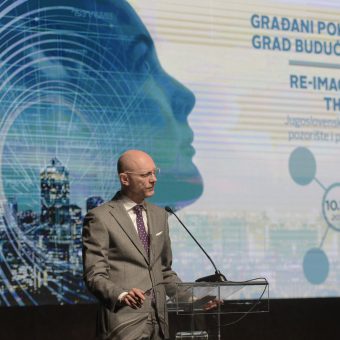
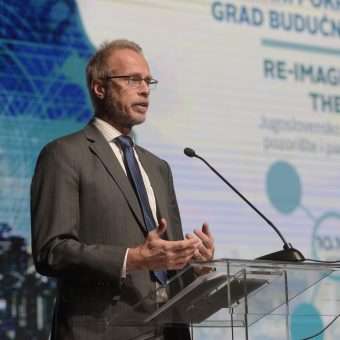
-
Oct 07 2019 Welcome to the conference “Citizens Build Smart Cities”
We are inviting all interested stakeholders to the knowledge-sharing conference “Citizens Build Smart City/Re-imagining the city”. Event will take place on Thursday the 10th of October, at the Jugoslav Drama Theatre (50 Kralja Milana Street, Belgrade) starting at 10:00 a.m.
The United Nations Development Programme (UNDP) in Serbia, acting as an implementing agency of the Global Environment Facility (GEF), is supporting the Ministry of Environmental Protection (MoEP) in implementing the five-year “Climate Smart Urban Development” Challenge project, jointly financed by the GEF, MoEP and partners.
An interactive event “Citizens Build Smart Cities/Re-imagining the City” will be held in order to accelerate the change towards climate – smart communities. The one-day open event aims to motivate and connect citizens, the private sector and local authorities to initiate the necessary transformation. Demonstrating the potential, we invite citizens and other stakeholders to join and start building common infrastructure.
The Conference is organized around three stages:
- Main stage (representatives of smart cities from around Europe present the best practices and solutions in open panel discussions),
- Smart stage (practical learning through workshops on open data and alternative financing with international and lecturers from Serbia),
- In the Zone (fair of ideas, new technologies and business models open to all citizens).
Conference Agenda and more information you can find on: http://gradovi-buducnosti.adriamediagroup.com/
-
Apr 22 2019 Five climate-smart projects receive funding for implementation in Serbia
The Ministry of Environmental Protection and the United Nations Development Program (UNDP) presented the results of the Climate Incubator and allocated funds for the implementation of innovative technology solutions and business models for reducing greenhouse gases in five municipalities and cities, but also throughout Serbia because of the high possibility of replication.
The grants for the co-financing of technological solutions and business models were granted to the following companies: JKP Toplana Šabac, Eso Tron, Jugo-Impex d.o.o, Sanicula d.o.o. and GreenEnergy Point d.o.o. Implementation of their ideas will contribute to the increase of energy and cost efficiency, increase in the share of energy produced from renewable sources, stimulate circular economy and improve waste management throughout Serbia, especially in Nis, Paracin, Boljevac, Rumenka, Sabac.
The representatives of five winning teams have signed agreements and funds were allocated to co-finance the implementation of their five projects. The total value of the awarded grant is $ 470,000, and the total investment value is about $11,000,000. The expected reduction of the greenhouse gas emissions, over the life span of the awarded projects, is 500,000t CO2 equivalent, or, to illustrate, just as much as if we planted 115,000 trees or afforested areas the size of 145 football stadiums.
“‘Climate Smart Urban Development Challenge’ is one of the most important projects the Ministry of Environmental Protection implements because it entails expertise, financial support, innovation and concrete results,” said Minister Goran Trivan. „Serbia has been polluted long enough, we want to solve the environmental issues together and through concrete actions. The Ministry will continue to support innovative ideas and new technological solutions that will give tangible results in the fight against climate change, but will also improve the overall quality of the environment,” Minister Goran Trivan emphasized at the signing ceremony.
“UNDP supports the development of innovative ideas through the Climate Incubator, as well as their implementation, so as to contribute to the climate change mitigation and sustainable development in Serbia. Addressing climate change also makes good business sense. Reduction of greenhouse gas emissions saves money because it improves energy and operational efficiency, reduces production costs and enhances product sales, making them more competitive,” said UNDP Serbia Resident Representative a.i. Steliana Nedera.
Public call “Innovation Challenge”, announced within the Climate Smart Urban Development Challenge, joint project of the Ministry and UNDP, has helped to identify and source innovative, climate smart development ideas and projects that reduce greenhouse gas emissions and support the climate resilience of local communities in Serbia. In addition to initial financial support, the award-winning innovators had the opportunity to develop their ideas into the mature projects ready for implementation, in the “Climate Incubator/Accelerator” established within the project.

